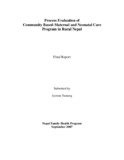Please use this identifier to cite or link to this item:
https://hdl.handle.net/20.500.14356/348Full metadata record
| DC Field | Value | Language |
|---|---|---|
| dc.contributor.author | Tamang, Jyotsna | |
| dc.date.accessioned | 2013-01-02T19:32:12Z | |
| dc.date.accessioned | 2022-11-08T10:14:27Z | - |
| dc.date.available | 2013-01-02T19:32:12Z | |
| dc.date.available | 2022-11-08T10:14:27Z | - |
| dc.date.issued | 2007 | |
| dc.identifier.uri | http://103.69.126.140:8080/handle/20.500.14356/348 | - |
| dc.description.abstract | Background: Most community-based maternal health and newborn (MNH) programs rely upon community health workers (CHWs) as a bedrock strategyto educate and counsel pregnant women and their family members. Both types of educational approaches that are used in these types of programs as well as the content of the educational packages have been refined and experimented with in research and programmatic contexts in Nepal over the past several years. With regards to package content, traditional antenatal health education content has expanded to include topics that are now often classified as birth preparedness. Community-level MNH programming has reached an important juncture as the Nepal MOH and its partners are in the process of investing heavily in an educational strategy—the Birth Preparedness Package, or BPP— that seeks to improve the health status of mothers and newborns. The BPP has been pilot-tested in a modest number of districts and has shown some initial promise to improve intermediate health outcomes such as client knowledge and utilization of health services as well as preparation for obstetric emergencies. However, antenatal health education and the BPP in Nepal would benefit from further study and experimentation—including possible revisions to the BPP strategy and tool package—before decisions regarding the standardization and roll-out of the BPP are contemplated. The Community-Based Maternal and Neonatal Care (CB-MNC) project, implemented by the government of Nepal with the support of the Nepal Family Health Program (NFHP), has incorporated the BPP as a central program strategy in three districts (Banke, Jhapa and Kanchanpur) where the CB-MNC is being implemented. The NFHP is currently considering how an alternative antenatal educational approach might be used in order to scale up the pilot program to the entire country. | en_US |
| dc.language.iso | en_US | en_US |
| dc.publisher | Nepal Family Health Program | en_US |
| dc.title | Process Evaluation of Community Based-Maternal and Neonatal Care Program in Rural Nepal | en_US |
| dc.type | Technical Report | en_US |
| Appears in Collections: | Post Graduate Grant (PG) Reports | |
Files in This Item:
| File | Description | Size | Format | |
|---|---|---|---|---|
| 538.pdf | Full Text. Download | 309.67 kB | Adobe PDF |  View/Open |
Items in DSpace are protected by copyright, with all rights reserved, unless otherwise indicated.
